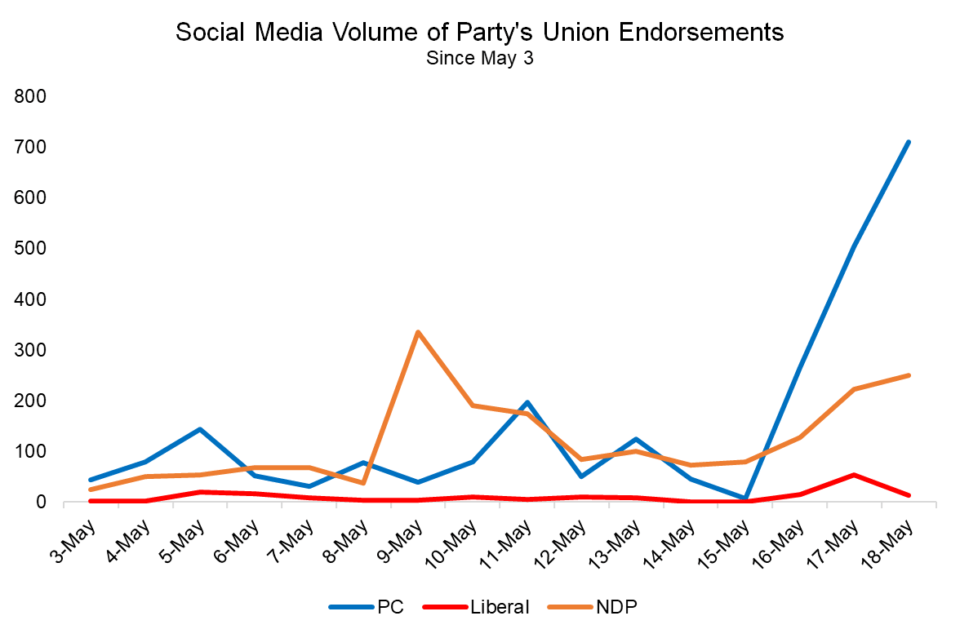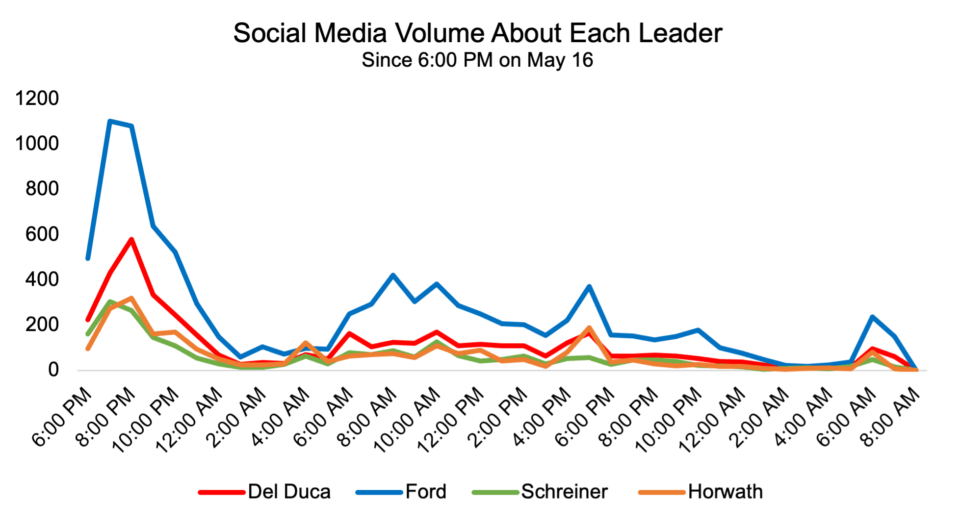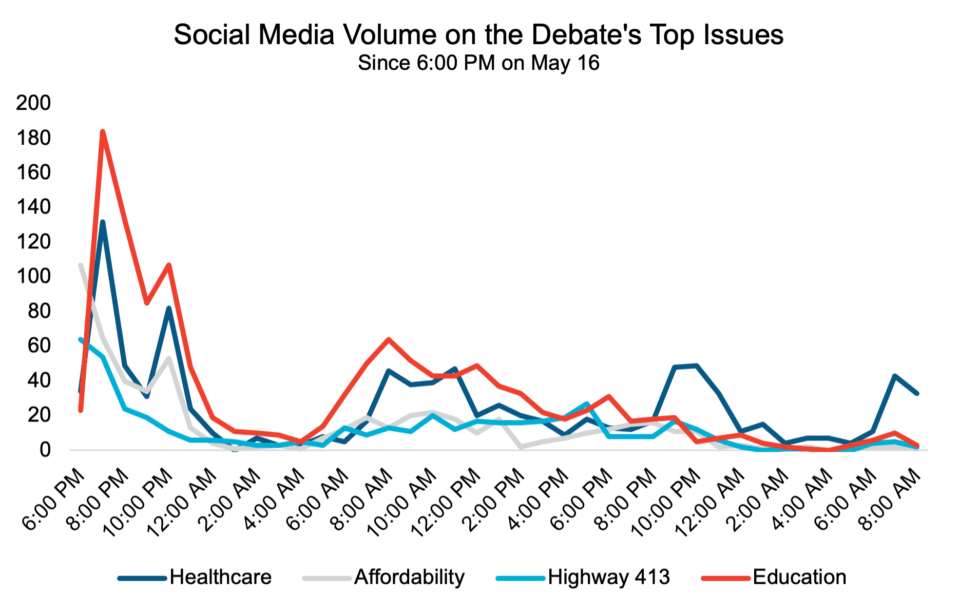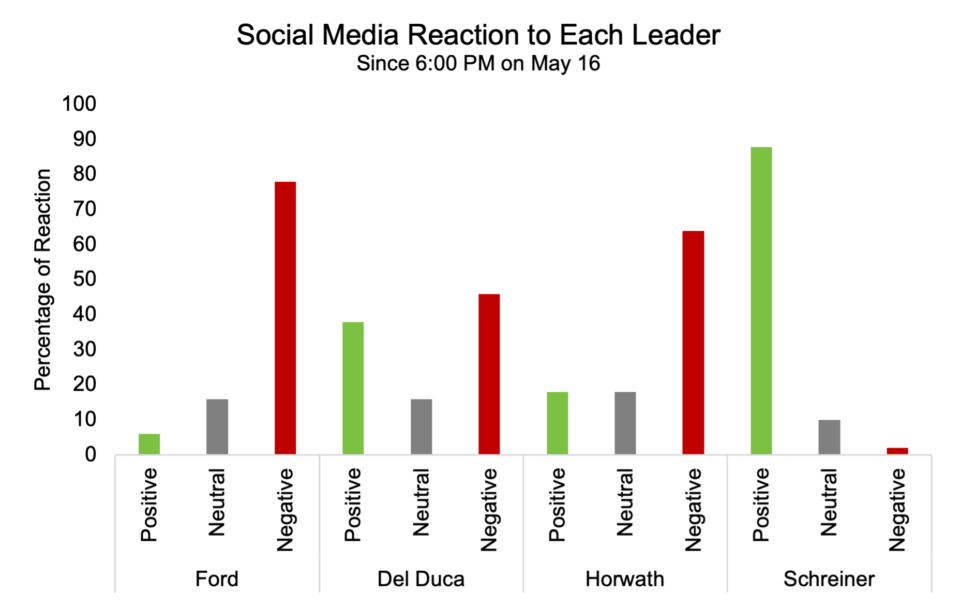Welcome to this week’s edition of our Push Back analysis. Each week, we’re asking Ontario voters whether they think political parties are gaining or losing ground on the issues they care about most.
In this edition, we’ve asked Ontarians about who they think can best tackle affordability and the Liberal commitment to mandate COVID-19 vaccinations in schools. We also looked online to see if the recent candidate troubles experienced by the Liberals and PCs are having an impact and if organized labour endorsements are getting traction with voters.
Protecting Pocketbooks
As we noted previously, the cost of living is the top concern for voters by a landslide with 7 in 10 Ontarians identifying it as their most important issue in this election. The issue lands 20 points over health care, just as the focus on the pandemic begins to diminish. This week we asked Ontarians what party is best positioned to tackle this top voter concern.
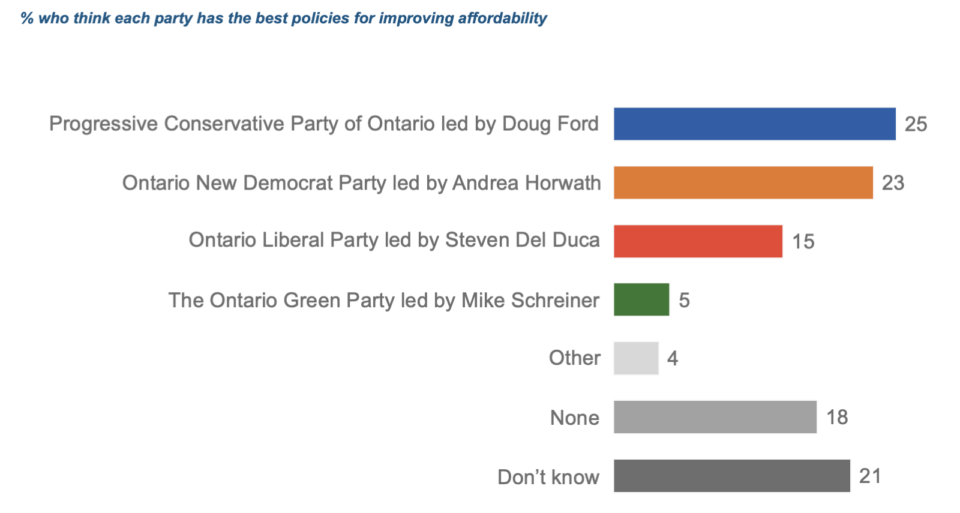
While the PC and NDP’s plans are clearly resonating with many Ontarians, what is equally notable is the large percentage of Ontarians who either believe that none of the parties can solve the issue or are undecided. Fully 39 per cent of Ontarians did not identify a specific party as having the best affordability policies. This highlights the fact a lot of voters are essentially up for grabs if one of the parties can effectively bolster their affordability plan.
The Ontario Liberals, who trail by a good margin on this issue have tried to tackle the affordability issue with their “buck-a-ride” commitment and other policies such as removing the HST from prepared meals. Despite their buck-a-ride policy receiving significant engagement online, so far it seems they’ve been unable to gain traction with voters as the affordability champions.
Fighting the right fight?
Notably, the Liberals have been campaigning on changes to education, such as mandatory COVID-19 vaccination in schools and bringing back an optional Grade 13, putting less emphasis on the affordability issue. Although we found their mandatory COVID-19 vaccination policy had broad support across the province, education and COVID-19 remain low priorities overall for voters.
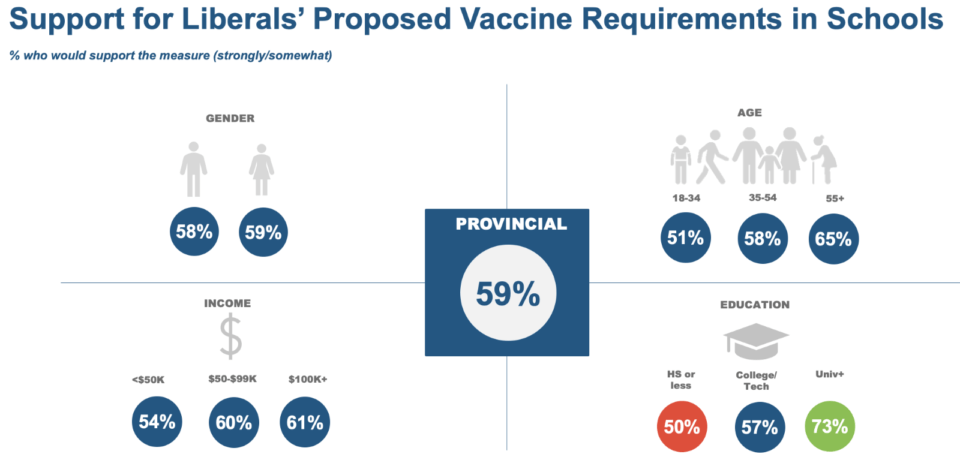
Candidate Trouble(s)
Over the past week, effective opposition and media research led to revelations about multiple candidates.
On May 10, media outlets first reported that Stephen Lecce, a high-profile PC candidate for King-Vaughan and Minister of Education, had been involved in a “slave auction” fraternity event while attending the University of Western Ontario in 2008. Lecce was quick to apologize for the incident and PC leader Doug Ford confirmed his party would support Lecce in the upcoming election, despite calls from teachers’ unions for him to be booted from the race.
Meanwhile, the Ontario Liberals were forced to drop three candidates in long-shot ridings and will no longer be contesting a full slate. Barry Stanley, the Liberal candidate for Parry Sound-Muskoka, lost his party’s nomination after reports revealed his homophobic conspiracy theories. The Liberals also dropped two of their youngest candidates, 18-year old Aidan Kallioinen in Sault. Ste Marie and 23-year old Alec Mazurek of Chatham-Kent-Leamington based on comments perceived to be homophobic that they made online as teenagers.
Breaking today is the fourth example of Liberal candidates making the news for past comments online. Noel Semple, carrying the party’s banner in Etobicoke Centre, has apologized for “hurtful” and “offensive” comments against the gay community. Media was quick to pounce on these stories – bad news makes for great press in an underwhelming election campaign – but are these issues gaining traction with everyday voters?
Online Analysis
As a high-profile cabinet minister with motivated stakeholders, the Lecce issue received more coverage. In the 24 hours after the incident was first reported on May 10, we saw a considerable spike in coverage with more than 7,000 social media posts on Wednesday. However, interest in the story quickly subsided, with just 2,000 posts on Thursday and coverage continuing to decrease on Friday.
Meanwhile, the three relatively unknown Liberal candidates received minimal media attention throughout the week, with only a slight increase in coverage on Friday when media outlets reported the Liberals would not field a full slate of candidates on the ballot.
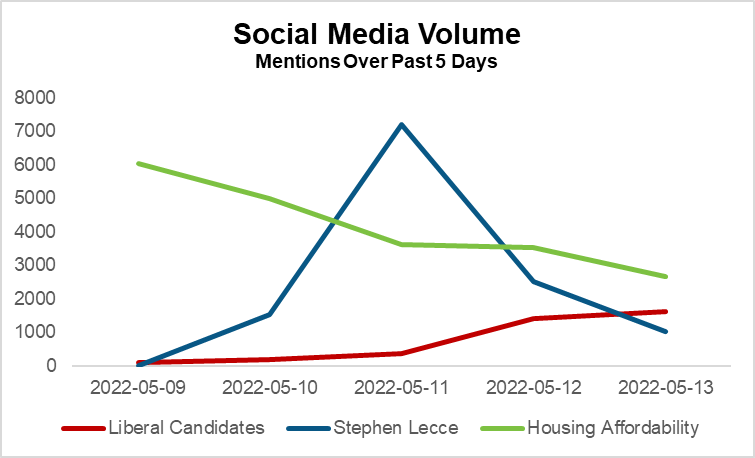
Drop or Not?
The Liberals and PCs found themselves faced with a dilemma – whether to drop controversial candidates or stand by their choices.
Steven Del Duca was quick to dismiss the Liberals’ long-shot candidates. With little hope of winning in PC strongholds in rural Ontario, it seemed to be an easy decision for Del Duca to remove candidates with questionable views from the Liberal banner. But when an op-ed surfaced that revealed Etobicoke Centre candidate Noel Semple held anti-LGBTQ views, Del Duca was quick to change his tune – allowing him to stay on. Ultimately, in an election where every seat matters, the Ontario Liberal Party placed the bar much higher for the removal of candidates with controversial views where there was a real shot at winning.
Likewise, Doug Ford faced a difficult choice, Ford was hard pressed to desert one of his star cabinet ministers in a winnable riding. On Thursday, Ford noted that Lecce had apologized for his actions and said he would stand by him in the upcoming election.
Verdict – Winning the Battle, not the War
With coverage already subsiding, candidate issues seem unlikely to loom over the campaign. Our polling shows voters are most concerned about the cost of housing, groceries, transit, gas and daily necessities. Ontarians might not like what they’ve seen this past week but candidate gaffes (big or small) are unlikely to be what comes to mind when they head to the ballot box.
Fruits of Labour
In an “ABC” (anyone but conservative) move, this week the Ontario Secondary School Teachers’ Federation (OSSTF) announced endorsements for 14 NDP candidates and 10 Liberal candidates in the Toronto area. OSSTF has also released their NDP and Liberal picks in Peel Region, London, York Region and other parts of the province.
However, not all unions are falling in line and endorsing NDP candidates. Premier Ford and the PC’s concerted effort to woo organized labour, including passing the Working for Workers Act, which banned non-compete clauses and raised the minimum wage, seem to be bearing fruit for the party.
Late last month the Laborers’ International Union of North America (LiUNA), which represents 80,000 workers across Ontario, endorsed Ford. In an interview following the endorsement, LiUNA International Vice-President and Manager Central and Eastern Canada Joe Mancinelli stated that “the Ford government has done more in these four years when it comes to labour, labour legislation, for workers and training than Del Duca’s Liberals did when they were in office.” On Wednesday, the PCs secured another labour endorsement from the International Brotherhood of Boilermakers (IBB).
Online Analysis
The below graph shows that social media volume about the three recent union endorsements has been low, with the OSSTF’s endorsement of the NDP receiving the highest level of engagement, peaking at 168 mentions. Volume then quickly dissipated and sat at 25 mentions after three days. The two PC endorsements followed almost identical paths, peaking at just under 50 mentions and eroding from there.
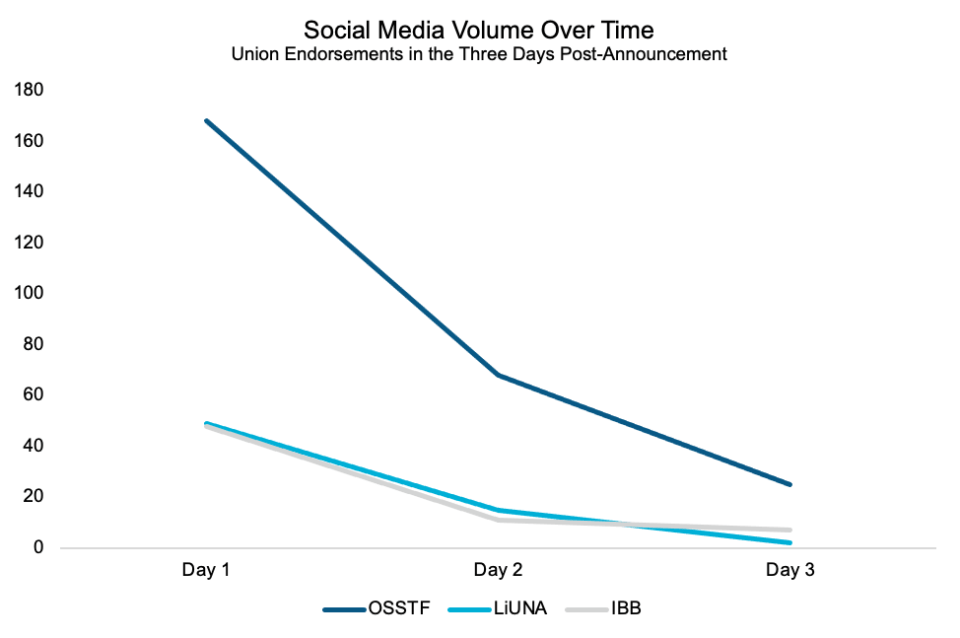
Verdict – Can’t Be Seen
Although the OSSTF’s endorsement of the NDP got the highest volume of mentions online, it only peaked at 168 mentions, far fewer than the top stories of the day like the controversy surrounding several PC and Liberal candidates.
However, social media conversation cannot paint a complete picture of the impact that a union endorsement can have on any of the campaigns. Unions can be effective at organizing their members to knock on doors, volunteer and get out the vote on election day. These boots on the ground can have a massive impact in close ridings where every vote matters.
Have any questions about the news out of Queen’s Park this week? Please reach out to our political experts at info@navltd.com.

